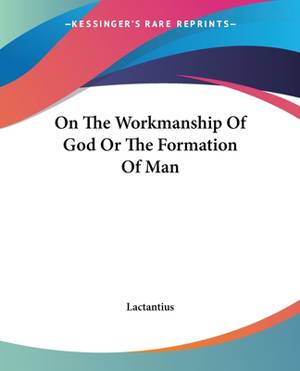
Door een staking bij bpost kan je online bestelling op dit moment iets langer onderweg zijn dan voorzien. Dringend iets nodig? Onze winkels ontvangen jou met open armen!
- Afhalen na 1 uur in een winkel met voorraad
- Gratis thuislevering in België vanaf € 30
- Ruim aanbod met 7 miljoen producten
Door een staking bij bpost kan je online bestelling op dit moment iets langer onderweg zijn dan voorzien. Dringend iets nodig? Onze winkels ontvangen jou met open armen!
- Afhalen na 1 uur in een winkel met voorraad
- Gratis thuislevering in België vanaf € 30
- Ruim aanbod met 7 miljoen producten
Zoeken
€ 25,95
+ 51 punten
Uitvoering
Omschrijving
On The Workmanship Of God Or The Formation Of Man is a philosophical and theological treatise written by the early Christian author Lactantius. The book explores the nature of God and his relationship to humanity, particularly in terms of the creation of man. Lactantius argues that God is the ultimate creator and that his workmanship is evident in the intricacies of the human body and mind. The book also considers the fall of man and the role of sin in human nature. Throughout the text, Lactantius draws on both biblical and classical sources to support his arguments. On The Workmanship Of God Or The Formation Of Man is a significant work in early Christian thought and is considered an important contribution to the theological understanding of human nature and the nature of God.For the parts of the intestines which receive the food and drink from the belly are more open than the other coils, and much more delicate. These entwine themselves around and encompass the bladder; and when the meat and the drink have arrived at these parts in a mixed state, the excrement becomes more solid, and passes through, but all the moisture is strained through those tender parts, (11) and the bladder, the membrane of which is equally fine and delicate, absorbs and collects it, so as to send it forth where nature has opened an outlet.This scarce antiquarian book is a facsimile reprint of the old original and may contain some imperfections such as library marks and notations. Because we believe this work is culturally important, we have made it available as part of our commitment for protecting, preserving, and promoting the world's literature in affordable, high quality, modern editions, that are true to their original work
Specificaties
Betrokkenen
- Auteur(s):
- Uitgeverij:
Inhoud
- Aantal bladzijden:
- 48
- Taal:
- Engels
Eigenschappen
- Productcode (EAN):
- 9781419138904
- Verschijningsdatum:
- 17/06/2004
- Uitvoering:
- Paperback
- Formaat:
- Trade paperback (VS)
- Afmetingen:
- 193 mm x 233 mm
- Gewicht:
- 117 g

Alleen bij Standaard Boekhandel
+ 51 punten op je klantenkaart van Standaard Boekhandel
Beoordelingen
We publiceren alleen reviews die voldoen aan de voorwaarden voor reviews. Bekijk onze voorwaarden voor reviews.











